DO-IT News April 1995

Volume 3, Number 2
Below are the articles of the DO-IT News April 1995 newsletter. These articles can also be seen all on one page at the Full Newsletter option.
Director's Digressions
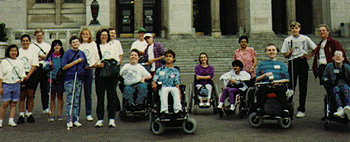
Most of our 1995 Scholars have been selected. Let me introduce them to you. Bror comes to us from Lenore, Idaho. His learning disability certainly doesn't affect his love of science, "especially . . . energy and mechanical things."
Andrew joins Shane (A Scholar who began in '93) to give us two DO-IT representatives from Montana (so far). Mr. Cassidy currently wants to become a draftsman. He's hoping to learn how to use a CAD (computer aided drafting) program since he has very limited use of his hands due to having Duchenne's muscular dystrophy. One of the things he is most looking forward to is meeting other students with disabilities through his contact with DO-IT!
Shawn, a self-proclaimed Husky fan, comes to us from Pullman, Washington. If any of you need to have your checkbooks balanced, this is the man to contact! He is looking to ready himself for meeting the challenges of being a college student with quadriplegia. Shawn is another welcome addition to the group.
Matt wants to become an electrical engineer. He's also interested in meeting other students with disabilities (he has a hearing impairment) and is excited about communicating with other people on the Internet.
"Most Inspirational" is how Jeremy school defines this tough young man. After sustaining a serious closed head injury, Jeremy has had the challenge of relearning everything. His current interest is to explore architecture and all the resources that the University of Washington and DO-IT have to offer.
Looks like we have a math whiz on our hands! Although a Junior at Hood River High School in Oregon, Carly is the same age as sophomores because she skipped second grade. She has used computers "as long as [she] remembers" and though she may need some assistance (she has arthrogryposis multiplex-congenita like DO-IT news editor and Ambassador Rodney) stand back and make way!
Bridget has been "hooked on science" since the sixth grade. If you want to get into dissection, she's the one to contact! Her hearing impairment presents some challenges in communication so she's looking forward to meeting people who can share experiences with her and help with her career decisions.
Bill has earned many awards in his brief high school career. As a member of the Gorilla Foundation he feeds his intense curiosity about gorillas, apes and other animals by reading everything he can get his hands on. He is looking forward to discovering more efficient ways to access his computer system (he has Cerebral Palsy) and exploring computer resources.
"Top ten percent," "Best student of the semester," "honor" are among the phrases his high school uses to describe Todd. He is interested in the brain, body and mathematics. He dreams of becoming a psychologist and is interested in learning from and about other people with disabilities. He is quadriplegic.
A strong interest in science and helping people combine to make Rachel a much wanted member of DO-IT. Her current interests in the sciences stem in part from the fact that she has renal failure. She's hoping to work with children and teens with disabilities (she has a hearing impairment as well) and wants to learn from them while they learn from her.
Straight from North Dakota, Jesse says he has been working with computers since the fourth grade. Legally blind, he finds computers and other technologies very useful. He has earned blue, red and white ribbons for his woodwork and plans to major in computer programming.
Because she is from a small (and I do mean small!) town in Idaho, Jorja hasn't had the opportunity to meet many peers who have disabilities (she has cerebral palsy) but she's looking forward to it! She's earned awards in drama and loves geometry.
Future accountant, brain surgeon or physicist, welcome Aimee from Boise, Idaho! These interests should keep her on her toes! A diabetic herself, she is looking forward to learning more about students with physical disabilities. She joined the right program to do that!
Matthew wants to answer the BIG questions like how the earth got here and how the universe was created. His disability has a big name, epidermolysis bullosa, and he has big goals. If you're looking for the next software design engineer for Nintendo or Microsoft, you may have found your man.
"He knows more about computer hardware and software than any professional person I've met in over 27 years in the D.P. Field. He is unbelievable!" How's that for a recommendation? Meet C.J. from Olympia, Washington. This young man with Attention Deficit Disorder certainly seems to have found his niche. His computer skills will be a fine addition to the program.
On behalf of the '93 and '94 Scholars, Mentors and staff, I would like to welcome these students to the DO-IT team! For freshmen and sophomores in high school who are interested in participating in DO-IT, we're accepting applications for next year already!
Calendar
Introduction to Adaptive Technology
Introduction to adaptive technology for computer users with visual impairments.
Location: ATL Lab, UW, Seattle; Time: 2pm - 4pm
For information or to register contact Dan Comden at (206) 685-4144; e-mail doit@u.washington.edu
April 25, 1995
College of Engineering Education Fair
For high school juniors and seniors interested in math and engineering.
Location: HUB Ballroom, UW, Seattle;
Time: 9:00am - 4:30pm
Call (206) 543-0340 for details.
April 26-29, 1995
Pacific Northwest Technology Conference & Expo
Showcase for developments in computer and adaptive technology for persons with special needs.
Location: Washington State Convention Center, Seattle
For information call WTA Access Center (206) 526-1240.
April 28 & 29, 1995
Health Sciences Open House -- "Discover Your Health"
Health exhibits to fascinate and inform visitors.
Location: University of Washington, Seattle
Phone Marilyn Hayes, (206) 543-3620, for information.
May 6, 1995
Preparing for the Transition to College
Workshop for students with disabilities, teachers and parents to learn about strategies and resources for preparation.
Location: University of Washington, Seattle
Time: 9am - 4pm
For information contact DO-IT at (206) 685-DOIT (685-3648); e-mail doit@u.washington.edu
May 10, 1995
Neuroscience Workshop
A morning plenary session followed by a pizza and pop lunch and afternoon workshops where participants can read friends' brainwaves or follow pulsating blood through cranial vessels.
Location: Seattle Sheraton Hotel;
Time: 9:00am - 2:30pm
For information contact aan@aan.com with attention Karen O'Brien in Subject Line, or (206) 621-9000.
May 17-19, 1995
President's Committee on Employment of People with Disabilities
For anyone interested in promoting employment opportunities for people with disabilities.
Location: Convention Center, Portland, Oregon
For information call (202) 376-6200; TDD (202) 376-6205.
May 18, 1995
Teleconference: Creating a World of Opportunity
Use of adaptive hardware/software for people with disabilities.
For information contact DO-IT (206) 685-DOIT (685-3648); e-mail doit@u.washington.edu
June 9-14, 1995
RESNA '95
Brings together people who use, develop and deliver rehabilitation and assistive technologies.
Location: Vancouver, British Columbia
For more information, contact RESNA, (703)524-6686.
June 14-17, 1995
Postsecondary Learning Disability Training Institute
Service providers of college students with learning disabilities explore legal issues, learning strategies, support for employment and building awareness.
Location: University of Connecticut
For more information, contact the Conneticut Postsecondary Disability Technical Assistance Center, University of CT, 249 Glenbrook Road, U-64, Storrs, CT 06269-2064; (203)486-0163; FAX (203)486-5037.
July 19-22, 1995
Association on Higher Education and Disability, 18th International Conference
For disabled student services staff at postsecondary institutions.
Location: San Jose, California
For more information, contact Ward Newmeyer, AHEAD U95, Office of the Chancellor, University of California, Berkeley, CA 94720-1500; (510)643-5116.
August 2-4, 1995
CSUN's "Virtual Reality and Persons with Disabilities"
International conference about virtual reality & people with disabilities.
Location: San Francisco, California
For more information, contact Center on Disabilities (818) 885-2578.
Transition to College - Just DO-IT!
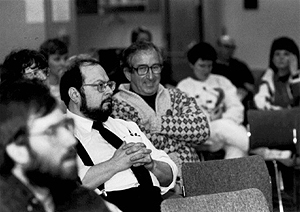
On Saturday, January 21, 1995 DO-IT hosted its second Transition Workshop--a free one-day workshop for high school students who have disabilities and their parents. Participants had a great time meeting new people and talking about issues that high school students encounter as they transition from high school to college and beyond. Themes of the workshop included self-advocacy and self-management.
The workshop agenda included introductory remarks from Sheryl Burgstahler and a showing of the DO-IT Scholars video. In keeping with the theme of self-advocacy, Sheryl showed the video, "DO-IT Working Together: Faculty and Students with Disabilities" (See "DO-IT Yourself"). She talked about a day in the life of a professor and how students can establish effective faculty-student relationships.
Kurt Johnson, from UW Rehabilitation Medicine, presented issues that can occur for a student when making the transition from high school into college. Kathy Cook, from Disabled Student Services, talked about support services the University of Washington offers to their students who have a documented disability, and how to interact with varying student service offices on campus.
After lunch, Dan Comden, DO-IT's adaptive technology specialist, gave an overview of current adaptive technology and showed slides of DO-IT Scholars and their systems. Karen Ozmun, from the Adaptive Technology Resource Center, and I, DO-IT Mentor and transition specialist, offered suggestions about finding financial resources for funding assistive technology and college expenses. Karen covered information about legislative issues in relation to assistive technology and then talked about funding resources in Washington State. I talked about various types of available financial assistance for college students and offered tips on filling out applications and cautions concerning overlapping funding resources.
The workshop concluded with a panel of individuals who have disabilities and have successfully completed transitions from high school to college and beyond. The panel members included DO-IT Mentors Sakuna Ganbari, Ed Pottharst, Agustin Musi, Dean Martineau, and me. Panel members shared college experiences and gave self-advocacy and self-management tips.
Our next Transition Workshop will be May 6, 1995. Call (206) 685-DOIT (685-3648) for information. Hope to see you there!
My Cyberspace Heaven
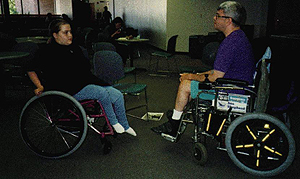
To school, home, then study. It was the same every day. Day in and day out. I had a schedule which I rarely strayed from. Monday was spent at therapy. Tuesday, Wednesday and Friday were spent lounging in front of the T.V. or reading a sappy romance novel. Thursday it was off to the chiropractor for a quick adjustment, then a bite to eat at a Subway nearby. I was a very shy girl, modest in all aspects. I didn't think much of my grades, or if I had talent or not. I just worked hard so that one day I could afford to support a family. I never thought about furthering my knowledge or going for something higher than my good grades at school.
This all changed one day when a small, white envelope came to my door. My therapist had known that I have a natural love for science, so she had sent me some information on a program through the University of Washington. This program was called "DO-IT" (Disabilities, Opportunities, Internetworking, and Technology) and was open to all Sophomores and Juniors who were in some way disabled and excelled in the science world. To be truthful, I wasn't very interested at first. I didn't think my scholastics could compare on a larger level. My mother kept urging me to apply. "You never know," she said. I finally agreed to apply in the latter part of 1993. I waited and waited, still no reply.
Weeks later my mother and I planned on attending a workshop called "The Transition to College" offered by the DO-IT program. During this conference I was pulled aside by Sheryl Burgstahler and told, "You've been accepted!" I really didn't know what kind of accomplishment I had achieved. Later I was chatting with a graduated DO-IT Scholar. He told me that only a few out of many were selected. There were applicants from all over the Western U.S. from six different states.
Through this program I received an IBM PC, modem, and Internet access. This system would change my life. I was not yet aware of the endless possibilities which the Internet could give me. During the DO-IT Summer Study I was enlightened on MOOing (interactive communication through a central computer). I have since made many friends world-wide. I have a "family" via the net and have learned many things. I also have a whole group of unbiased people that I can communicate with through a few strokes of a key. The DO-IT program has changed my life forever.
My Experience as an LD Student
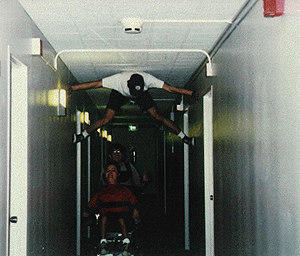
In this paper I will talk about the effects of learning disabilities (LD) on children in the public school system. I am basing this paper on my research, observation and personal experiences. It is my belief that learning disabled children have a hard enough time in the system without teachers and kids making fun of them.
The cause of LD is not really known, but what is known is that it seems to be hereditary. That means that if your parents have it you have more of a chance of having it as well. Other factors are premature birth, poor nutrition in the mother or infant, alcoholism, infants that have medical problems soon after birth and less learning before they go to school. Boys are affected three to five times more often than girls. Someone with LD is not mentally retarded, emotionally disturbed or brain damaged. LD does not mean stupid. Most LD kids have average intelligence and many are gifted.
There is no known cure for LD and it is not generally outgrown, but with proper education kids learn to find ways around the obstacles put in their way by the school system. The school system and some teachers seem to believe that everyone has to work and learn in the same way. This hurts LD kids' self esteem, mental health, the way they look at life, the way others look at them and their ability to have goals. They believe they are stupid and can't do anything right. Some kids respond to this treatment with anger and hit back, use drugs to cope or just quit trying. With this attitude they may go into jobs with skills under their real potential.
What helps is support from their families and teachers to help them get around obstacles. A loving family can help by not teasing about school work, but loving the child for what they are and praising their efforts to get what they have. Families teach children they are not stupid, lazy or don't care. LD kids need lots of help to get their work done because they work so slowly. They might need extra time for assignments and get directions according to the way they learn best. Teachers and parents need to work together as a team. Parents need to be sure that the child's different educational needs are not being neglected. Kids aren't always able to fight and be advocates for themselves.
Many people have lived through awful learning experiences to become very successful. Dr. Richard YaDeau is a surgeon who failed his first eight years of school. Thomas Edison was an inventor who could not be taught in the public school system. He was labeled mentally ill and not educatable. General George Patton didn't learn the alphabet until he was nine and didn't learn to read until he was eleven. Stephen Cannell, dyslexic, wrote and produced the Rockford Files, the A-Team, and other TV shows. Dr. Josef Sanders owns a publishing company. The schools wanted him in a school for the retarded, but his mother said no and taught him at home.
My experience is that I was told that I was going to get behind in reading more every year. The attitudes of teachers told me that I was stupid and would not ever be successful. It is hard for me to write about LD because I am remembering all the old feelings of hopelessness, worthlessness, of not being as good as other kids, not having friends and years of teasing. I think that it is not really possible to explain to someone who has not had the experience of just how hard it is to work and work and work just to keep up with everyone else day after day for years without knowing if it is worth it.
Every kid should be educated the way they learn best. This is not just a good idea--it is the law. The law has given me hope that someone cares in addition to my family. This law says that someone believes that I am worth the extra effort to educate because I can be a successful part of society as an adult.
Kids with LD do not have to be channeled off into labor jobs just because they can't learn at the same rate in which other kids learn. The new laws make me feel that there is hope for me and others going through the school system and somehow overcoming obstacles, adapting to our way of learning.
I have learned that I am not stupid, but that I process information slower than other students. In fact, I have learned that I am smarter than lots of kids.
DO-IT at the UW Computer Fair!!!
The 21st annual UW Computer Fair took place on March 15th & 16th in the Husky Union Building at the University of Washington. Once again, it was a great success. It was fun to take a stroll around the area and visit the many booths where companies--Microsoft, Apple, IBM and many others--displayed their newest and hottest wares.
At the Computer Fair people sampled different companies' products and services--whether it be a new legal gopher or a software upgrade.
This year, in addition to an informative and interactive booth exhibit, DO-IT sponsored "Teaching and Technology: Empowerment for People with Disabilities"--a series of seminars and demonstrations to explore how technology can be used to enhance learning and employment opportunities for individuals with disabilities. Seminar topics included college transition, success in college, how technology opens career doors, adaptive technologies, access to assistive technologies, individuals with disabilities on the net, and an overview of the DO-IT project.
Computers and adaptive technologies for individuals with disabilities were featured and demonstrated by DO-IT Scholars and staff at the DO-IT booths in the exhibit area.
Everyone had a great time this year and we hope next year is equally successful. DO-IT would like to thank Scholars, Mentors and staff who helped DO-IT do it at the UW Computer Fair!
Post-Secondary Institutions and the Law
Section 504 of the Rehabilitation Act of 1973 and the Americans with Disabilities Act of 1990 prohibit discrimination against individuals with disabilities. According to these laws, no otherwise qualified individual with a disability shall, solely by reason of his/her disability, be excluded from the participation in, be denied the benefits of, or be subjected to discrimination under any program or activity of a public entity.
"Qualified," with respect to post-secondary educational services, means a person who meets the academic and technical standards requisite to admission or participation in the education program or activity, with or without reasonable modifications to rules, policies or practices; the removal of architectural, communication or transportation barriers; or the provision of auxiliary aids and services.
"Person with a disability" means any person who
- has a physical or mental impairment which substantially limits one or more major life activities (including walking, seeing, hearing, speaking, breathing, learning, and working),
- has a record of such an impairment, or
- is regarded as having such an impairment.
Examples of disabilities covered by legislation include AIDS, cancer, cerebral palsy, diabetes, epilepsy, head injuries, learning disabilities, loss of limbs, multiple sclerosis, muscular dystrophy, psychiatric disorders, speech and hearing impairments, spinal cord injuries, and vision impairments.
Much progress must still be made before all post-secondary programs are accessible to people with a variety of disabilities. Prospective students should keep access issues in mind as they select institutions for post-secondary study and, once enrolled, be prepared to be assertive in obtaining their entitlement to equal access when provisions are not already in place.
DO-IT Yourself
You asked for it, soon you'll be getting it. In response to the need for a short, easy to deliver, and effective disability awareness presentation, DO-IT has created a DO-IT-yourself package for post-secondary faculty, staff and student groups--"Working Together: Faculty and Students with Disabilities Presentation Materials." The materials include an open-captioned nine minute videotape; two sample scripts; handouts; and overhead transparencies.
According to director Sheryl Burgstahler, DO-IT "created the videotape with a lot of input and feedback from faculty members and students who have disabilities. Their input enabled us to create an effective package that addresses issues that will help faculty and students with disabilities effectively work together." The package includes all of the materials necessary for a person to deliver a 20 minute introductory presentation, regardless of past experience working with students who have disabilities. Guidelines are also provided for hosting a more comprehensive presentation intended to stimulate departmental discussion and action toward the creation of an educational environment in which all students can learn and express ideas.
The package is particularly appropriate for individuals and departments in science, engineering, mathematics and technology fields; disability services; student affairs and academic counseling. Funding provided by NEC Foundation of America, US West Communications, the National Science Foundation, and the University of Washington made the creation and distribution of these materials possible. Copies are available at cost. For more information, contact DO-IT, (206)685-DOIT (685-3648) V/TTY or e-mail doit@u.washington.edu.
Recombinant Genetics
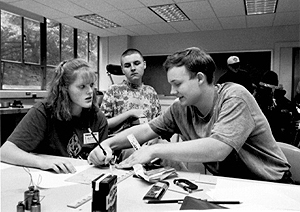
Phase II Scholars who return to the University of Washington for their second Summer Study spend the week in small groups with a faculty member focusing on a specific area of study.
Our group study project in 1994 dealt with a few of the more basic techniques used in Recombinant Genetics. The focus of our four day study was to artificially create, by genetic means, the organic chemical Streptavidin, which is important to biotechnology for its ability to transport medicines to a desired location in the body.
The first day of the project was dedicated to familiarizing us with the basics of genetics. When referring to a DNA molecule the analogy of a train seems to work best. DNA is like a train composed of a very few types of "boxcars" that all attach to each other end to end. Strands of DNA several "boxcars" long carry instructions for specific things. With this basic understanding of what DNA is we were able to understand what was happening in the colored specimen tubes filled with chemicals which we manipulated for the next three days.
The second day we began our excursion into the wonderful world of Recombinant Genetics. In simpler terms Recombinant Genetics is taking a sample of genetic material (DNA) and breaking it. Then you take the pieces of the strand and either remove something you don't want or put something foreign and new in, then reassemble the pieces. Through a complex procedure called PCR or Polymerase Chain Reaction, the group edited E-Coli DNA so that it became a living factory creating Streptavidin. The whole process took more than one day to complete but what we set out to do in our most major lab was accomplished. We had actually modified a life form genetically to produce a chemical that it does not produce naturally and that is beneficial to mankind!
Our group also had the opportunity to do an experiment called Electrophoresis. This process separates fragmented DNA across a gel solution by molecular weight, leaving dark bands consisting of DNA of different weights. Both before and after our experiment creating Streptavidin we were given the opportunity to look at molecular structures on a special graphics computer. It had a feature which allowed us to see the various pictures in nearly 3-D with the use of special glasses. Along with the discussions of what and how things are done in genetics this was one of the most fun things we did in our special project.
My First Two Quarters of College
My first two quarters in college at the University of Washington have been wonderful. During this time I have learned some very important things that apply to all aspects of life.
I have always known that perseverance is important, but college has reinforced my understanding. Often, classes can be discouraging and difficult. In the English composition, calculus, and chemistry classes that I have taken, I've looked at assignments and often wanted to give up. But I have learned that the assignments aren't as terrible as they appear at first. If you work hard on them you can succeed in doing them. This isn't always easy. Many times I would rather read a good book or spend time with friends, but I have found that if I choose to persevere in my studies, I can do even the most difficult assignments.
I believe that perseverance is important to many parts of life. Just because something is difficult, doesn't mean you shouldn't take the time to do it. Anything is possible if you put the proper amount of effort into it. This doesn't mean that you won't have to take a class twice or that you will for sure do something right the first time, but if you keep working at it, it can be done.
The second thing I learned is the importance of people skills. I have always been told that they are important, but I didn't completely realize the truth to this until I came to the UW campus, where I interact with many people everyday. For example, because I am blind, people often try to assist me in various ways. I don't always want to be assisted and sometimes people go about helping me in ways that I don't like. But it is very important that I show appreciation for what people do, as long as they don't do something like drag me across a street that I didn't want to cross in the first place. People don't always understand that they don't need to help or that they aren't helping correctly. However, their intentions are usually good, and instead of getting angry at them or frustrated with them, I do my best to smile and thank them. Sometimes this is hard to do, especially if I'm having a bad day. There are situations where I can gracefully decline any help that is offered. However, there are other times when showing appreciation is the thing to do, and since the help was given with good intentions, the person should not be criticized or be made to feel badly.
People skills are also important in negotiating things like testing arrangements with professors. In the case of brailling a test, this involves trying to get the test early. Some professors simply cannot write it far in advance because of their other responsibilities and because they aren't sure how far along they will be in the course at the time of the test. It is important to consider their situation while presenting your own. These are just some of the reasons to have good people skills.
Last, I would like to offer a word of encouragement to disabled students who have faced difficulties in forming even casual friendships in high school. College is a wonderful place for this. I didn't really have friends in high school, but I have made many here.
It helps to live in dorms, if you can, because you are in close vicinity to many other people. Dorms also have lounges where people can gather and meet. I would advise anyone who can live in a dorm to do so. It also helps to become involved in clubs, though I haven't as of yet. Even so, this option should be left open. Also, there is the chance that you will make friends in some of your classes. It is good to have a social life because it offers a break from the stress of studying.
I've only been in college two quarters. So while I have learned a great deal, I have much more to learn. College isn't only about academics. Many other things can be learned there, and probably the most important is keeping your mind open to learning new things.
DO-IT Portraits
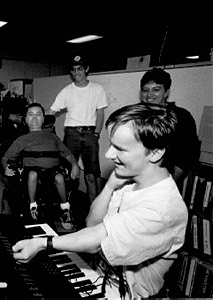
Why did I become a Mentor? For the obvious reason; since I'm disabled and have taken the science and engineering track myself, I could identify with what people in DO-IT wanted to do. DO-IT is an interesting idea and I wanted to see how it went, and maybe help people out here and there.
Since this is a portrait, I guess I should give some background. My disability is a profound hearing impairment. It was only "severe" in my teens, which meant I could at least appreciate some music back then; but I can still "remember" songs in my head (70's Pink Floyd pops up a lot). Anyways, I grew up and went to college and grad school in Connecticut and upstate New York. I'm now an assistant professor in computer science at Edinburgh.
Besides the fact that I've never met anyone in DO-IT personally, living in the U.K. is not very different from life in Seattle. E-mail and networked information is a big part of the day between people who work in the same building too. Still, it would be nice to be able to place faces with e-mail messages.
What are some positive and/or negative experiences I've had as a Mentor? All I can say is that it is a good experience to "be involved" and sometimes have some ideas or raw info to contribute. I can't think of any negative experiences, except, maybe, exploding mailboxes (figure that one out).
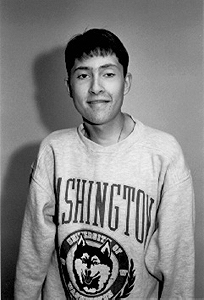
Scholar Travis
My name is Travis. I am from Monteview, Idaho. I am 17 years old and a senior at West Jefferson High School in Terreton. Like Rodney, I am a confessed computer addict. Right now I am writing programs in the C++ Language on the PC. My disability is several birth defects that I have: valgus of the ankles--they're weak so I have to wear braces; I have bladder and kidney problems that require me to take pills; and I have achondroplasia--which is shortness of the limbs. But, what's a disability? All I know is that I like computers and my car, a Cavalier Z-24 (black). I want to major in computer science and be a professional programmer or software engineer.
Scholar Mitch
My primary disability is spina bifida. It is minor, but the secondary condition, scoliosis, has caused me to miss a lot of school due to surgery and hospital stays. My greatest scientific interest is genetics. I hope to receive a degree in molecular genetics and work for a bio-technology company. DO-IT has exposed me to a wide range of careers in science and given me the opportunity to experience first hand what it is like to be a scientist in some of those fields. On the Internet I have access to a whole world of people and information. This is an experience that I will appreciate for the rest of my life.
Jane Comes to DO-IT
Welcome the latest member of the DO-IT staff, Jane Sparks! Jane, a native of Southern California, has worked at Shoreline Community College for the past five years. Most recently she was employed in the Community Integration Program which provides academic and personal support for twenty adults with cerebral palsy.
She said of her experiences so far at DO-IT, "I couldn't ask to work with a nicer or more interesting group of people. It's so easy to be excited about my job because it truly is a wonderful program!"
Jane is working on her masters degree in education at the UW Bothell campus. She once rode her bike from Canada to Mexico and she has what some consider an offbeat sense of humor. In her position with DO-IT she will be, among other things, the overnight staff during the Summer Study program. So, Scholars, watch out for Jane at dorm curfew time! Let's give her a warm welcome!
More About DO-IT
DO-IT News is published at the University of Washington with input from the staff, Scholars and Mentors of DO-IT. The College of Engineering and Computing & Communications coordinate the program. DO-IT is primarily funded by a grant from the National Science Foundation.
- Publisher -- Sheryl Burgstahler
- Editor -- Rodney
To request more information .